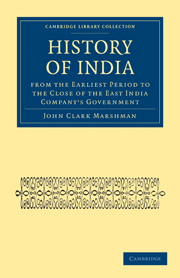Summary
SECTION I
LORD CANNING'S ADMINISTRATION—THE MUTINY—MEERUT—DELHI—THE PUNJAB
Lord Dalhousie was succeeded by Lord Canning, the 1856 thirteenth and last of the Grovernors-general of the East India Company, and the first viceroy of the Queen. His father, George Canning, was appointed governor-general in 1822, but did not embark. He himself had sat in the House of Lords for twenty years, and filled several offices of state, and had thus acquired a good store of official experience. At the valedictory banquet given to him by the Court of Directors he uttered these memorable expressions:—“I wish for a “peaceful time of office; but I cannot forget that in the sky “of India, serene as it is, a small cloud may arise no larger “than a man's hand, but which, growing larger and larger, “may at last threaten to burst, and overwhelm us with “ruin.” The succeeding narrative will show how prophetic this enunciation proved to be. His administration was marked by a series of events of unexampled magnitude—the mutiny and extinction of an army of 150,000 sepoys,—the wholesale massacre of Europeans, men, women and children—the loss and recovery of the North-West provinces—the dissolution of the East India Company, and the annexation of the empire of India to the Crown.
- Type
- Chapter
- Information
- History of India from the Earliest Period to the Close of the East India Company's Government , pp. 489 - 530Publisher: Cambridge University PressPrint publication year: 2010First published in: 1876



